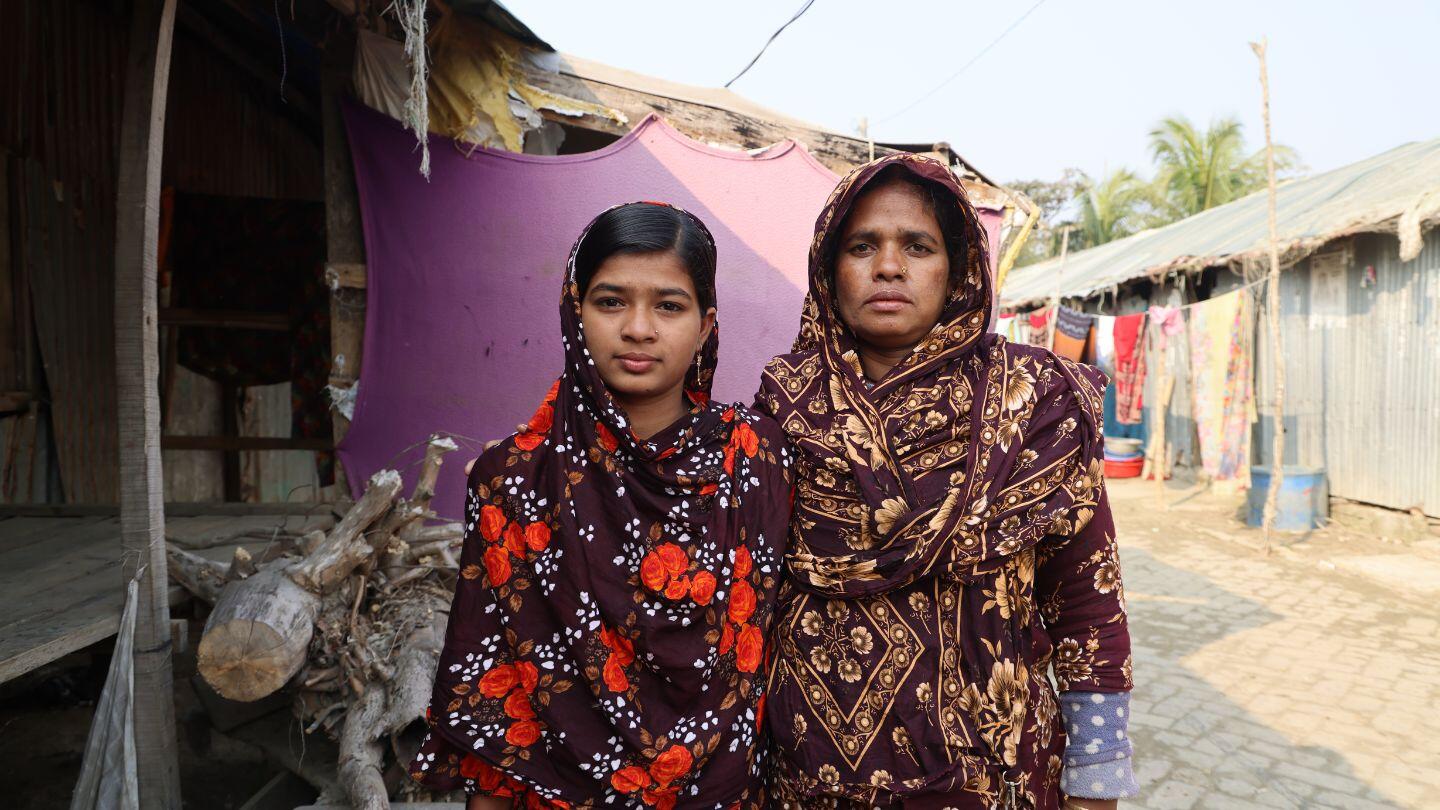A vacuous look casts over the eyes of Hawa Nur and her daughter Tamanna as they recount the devastating impact of cyclone Remal in 2024. Their house, their few possessions and their lives were all destroyed by the cyclone. For the 13-year-old Tamanna, the loss was deeply personal –her school bag, books and the burqa she proudly wore to school were all gone.
More trouble lay ahead for her family. “After the Remal cyclone, our condition worsened. There was no home to return to as the entire village was submerged. We were in the shelter home for 7 days.” They are currently living in a small makeshift single room about 150 sq ft which the government allocated for cyclone survivors like them. The shelter, constructed from bamboo and plastic sheeting, barely accommodates the six members of their family. “We somehow manage to cram ourselves in. We have nowhere to go.”
Their struggle ordeal has been the most heart-wrenching one. Hawa Nur's husband, who is a fisherman and also drives a local rickshaw barely manages to sustain the family, as he has been diagnosed with a health condition which leaves him seeking medical care almost every other day. Nur’s mother-in-law is paralysed and needs constant care. This has put Nur under a lot of pressure, as she has come out from severe depression and is still recovering. Thus, unable to see the family’s condition, she took it upon herself to earn a supplementary income for the family through odd jobs such as making fishing nets, weaving bamboo baskets, and daily wage agricultural work.
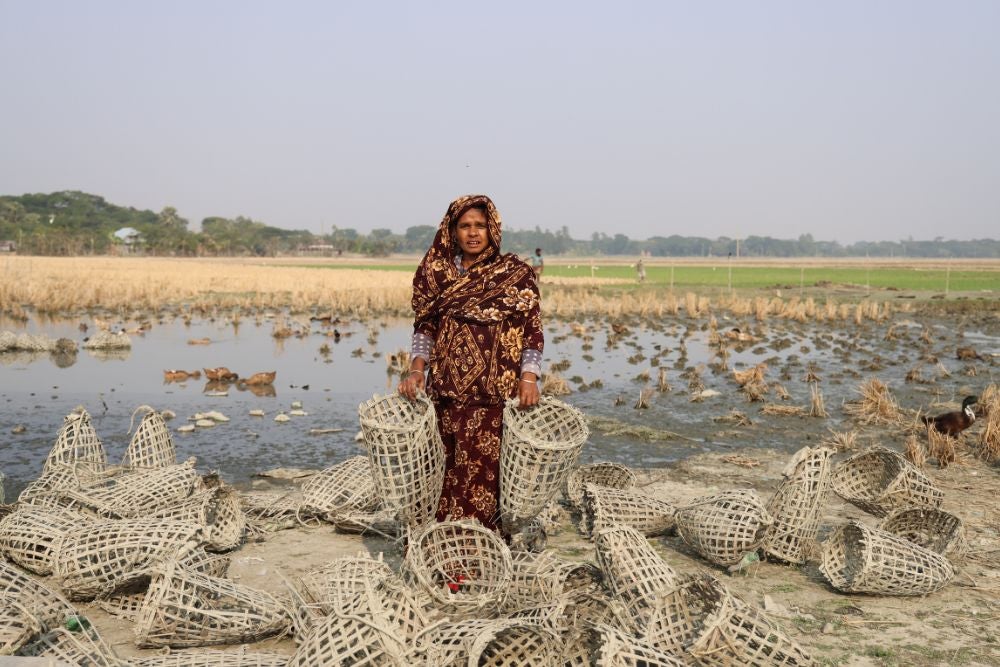
Cash assistance from UNFPA: a lifeline for Tamanna’s education and future
Tamanna stands out from other girls in her locality. Her most prized possession is the new school kit– a bag, books and stationery items, a colourful umbrella, slippers, burqa and accessories such as bindi, and clips– that she bought with 16,425 Taka in three instalments that she received along with 40 girls like her in her community as part of the cash assistance to sustain education in the aftermath of a humanitarian crisis, a UNFPA initiative in Patuakhali. After a gap of 4 months or so, Tamana was re-enrolled into class VIII.
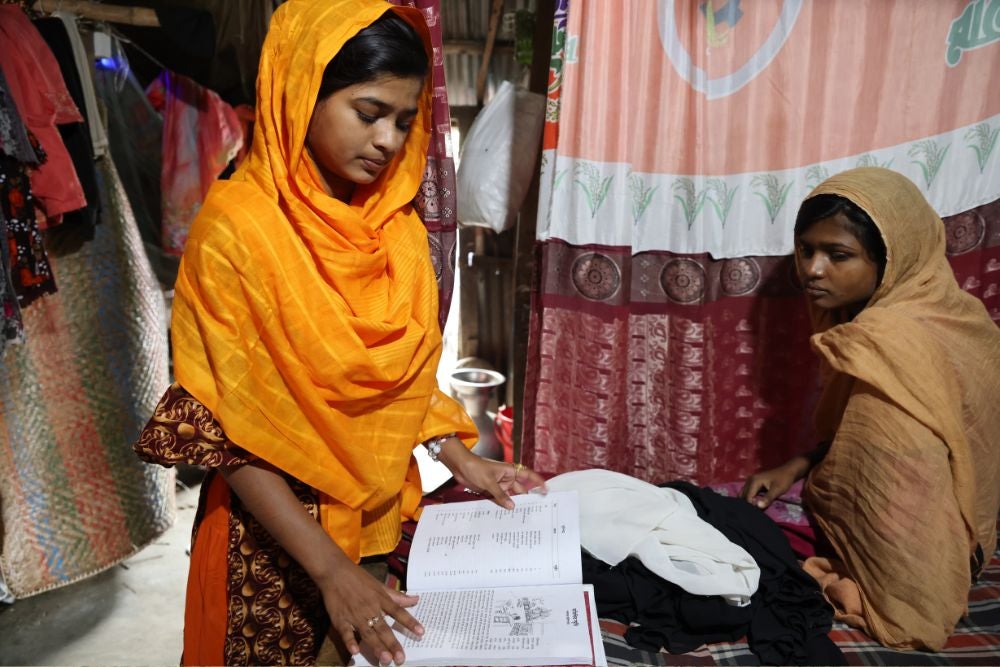
This initiative targeted the most vulnerable families across three districts (Patuakhali, Bagerhat and Satkhira) in Bangladesh severely impacted by cyclone Remal, particularly those who were unable to afford the continuation of their adolescent daughters' education. In exchange, the parents pledged to support their daughters' education and not marry them off.
A school representative acknowledged the commitment, which was then authorized by the Upazila (Sub-district) Secondary Education Officer. Monitoring and oversight were provided by youth volunteers in the community, implementing partner field staff, and a nominated teacher to ensure effective implementation.
Tamanna's daily journey to school is far from easy. She walks over 2 kilometres to reach the nearest road, where public transport is available. However, financial constraints leave her with no choice but to continue on foot till Khejura Pilot High School— which takes her almost an hour. The same ordeal awaits her on the way back home.
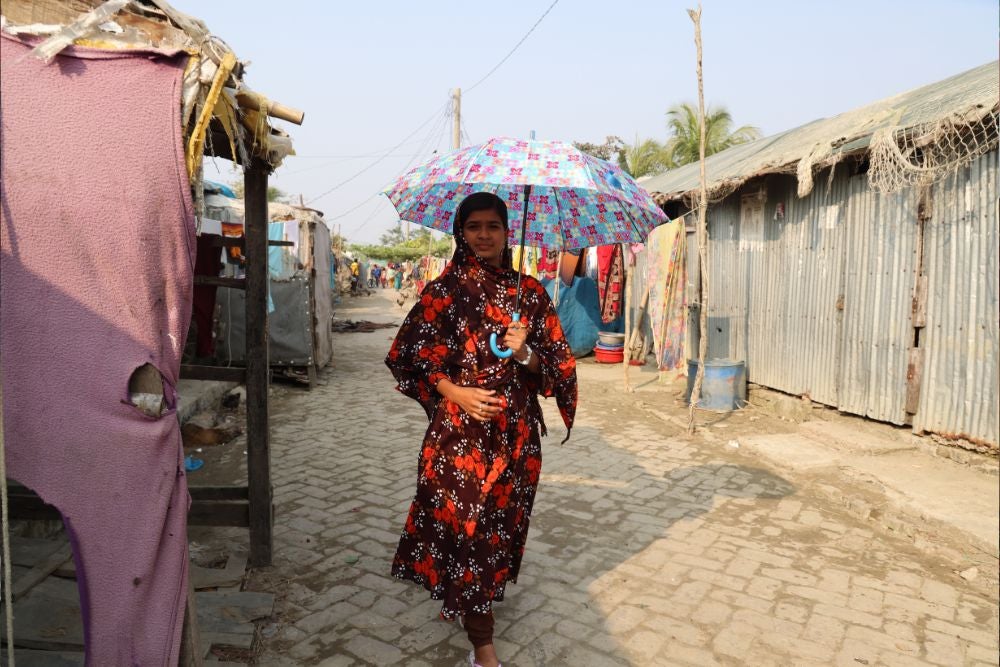
Despite these challenges, Tamanna loves going to her school. She is well-loved by both her teachers and classmates. “ She holds the second rank in her class and has won interschool awards for her English reading and dance skills. This girl never wants to help with household work. She is always busy studying,” with a chiding yet proud tone, remarks Nur.
However, for several months after the cyclone, Tamana could not attend school as her father was unable to pay the accrued school fees. Missing her lessons and schools was too excruciating and restricted mobility at home made the situation worse for her. “ Earlier, I was allowed to play with the children in my area. However, now my parents do not allow me. When I insist, I am rebuked. They say, "You are grown up now, it does not suit you to play “-- however with a smile, she continues, “ School is so much better, I get to play, dance, and have fun with my friends. I feel alive.”
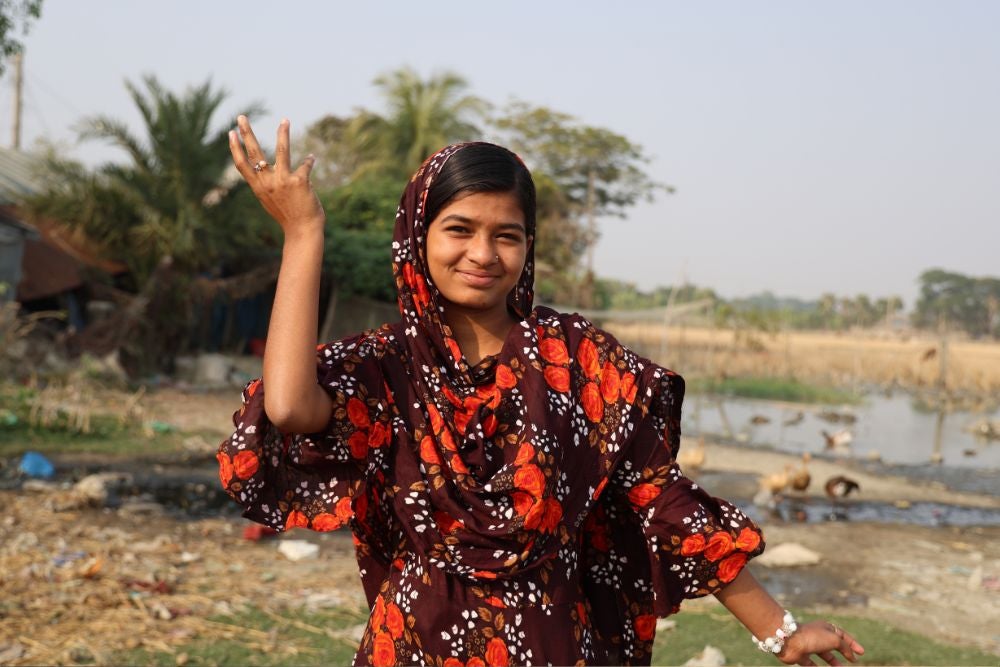
Things changed for her after she received the cash assistance. Her father enrolled her back and very soon she was able to catch up on the missed lessons. She did not notice that some of her friends were missing, and then she heard that they had been married off. “ I am really happy that I did not have the same fate. This makeshift home barely has enough space for me to study or concentrate. At times, the smoke from the clay stove which my mother uses burns my eyes. Yet, I am thankful to my parents ”
The hardest choice: Marriage or Education?
Nur’s eldest daughter was very beautiful, and due to strong societal pressure, she couldn’t remain unmarried for long and had to discontinue her education. With two growing daughters by her side, she knew that very soon there would be marriage proposals for them too, especially for Tamana who had just turned 13 years old. Her second daughter's future was sealed given her mental instability for which she left her school and now she stays at home and helps with household chores.
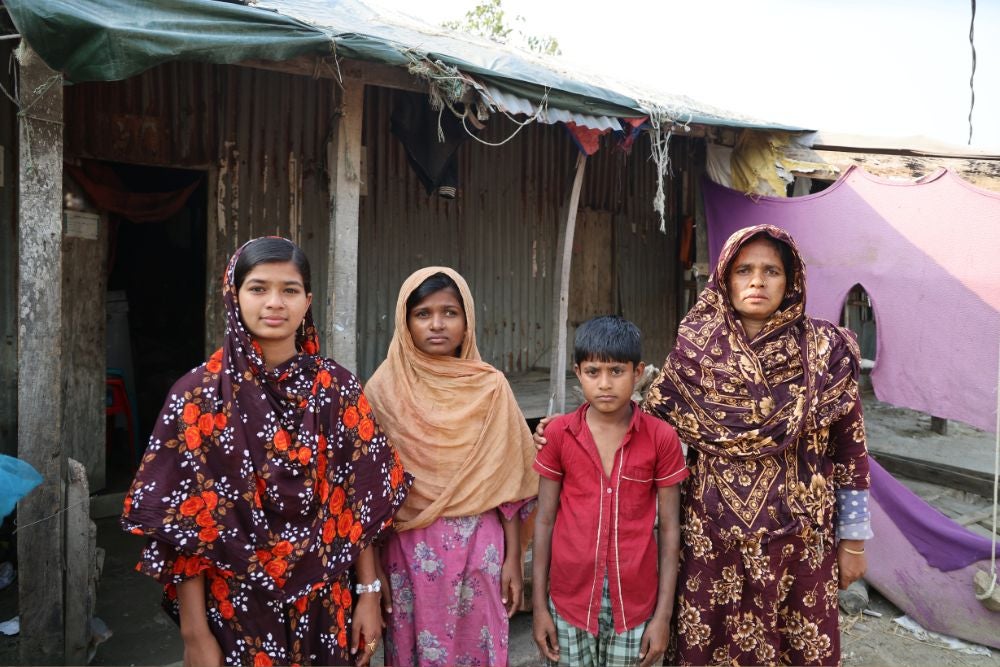
Nur could not bear the thought of marrying Tamana off as she was fiercely passionate about continuing her education and chasing her dreams. However, the aftermath of the cyclone and the worry of her daughter’s safety forced Nur to consider the marriage proposals. “ I asked my husband to arrange Tamanna’s marriage, as we had no money for food or to continue her education. Her safety was also an issue”
UNFPA’s cash for assistance acted as a ray of hope literally for her and her family. “The 16,425 taka is a blessing from Allah (God). It saved my daughter and gave us a second chance.”
In the Patuakhali district, where this intervention was implemented, cyclones, tidal surges and inundation, salinity intrusion and other natural disasters are common, with their frequency and intensity increasing in recent years. The people here have learned to endure these hardships, yet they remain trapped in cycles of poverty, unable to break free.
Child marriage in Bangladesh, one of the world’s most affected regions robs millions of girls from their childhood. While significant progress has been made in reducing child marriage rates, 51% of Bangladeshi girls still marry before the age of 18. Climate crises and natural disasters exacerbate the vulnerabilities of poor and marginalized people. Often, women and young girls face the brunt of it.
“There is an urgent need to strengthen and scale-up targeted cash assistance for the most vulnerable adolescent girls in disaster response, reinforcing integrated programming across the humanitarian-development nexus. Not only young girls like Tamanna can survive the climate-induced hazardous events and longer-term hardships, but also that their education is undisrupted and we have a strong chance to prevent child marriage. No mother or parents should be forced to make this hard choice," appeals Masaki Watabe, UNFPA Representative a.i.
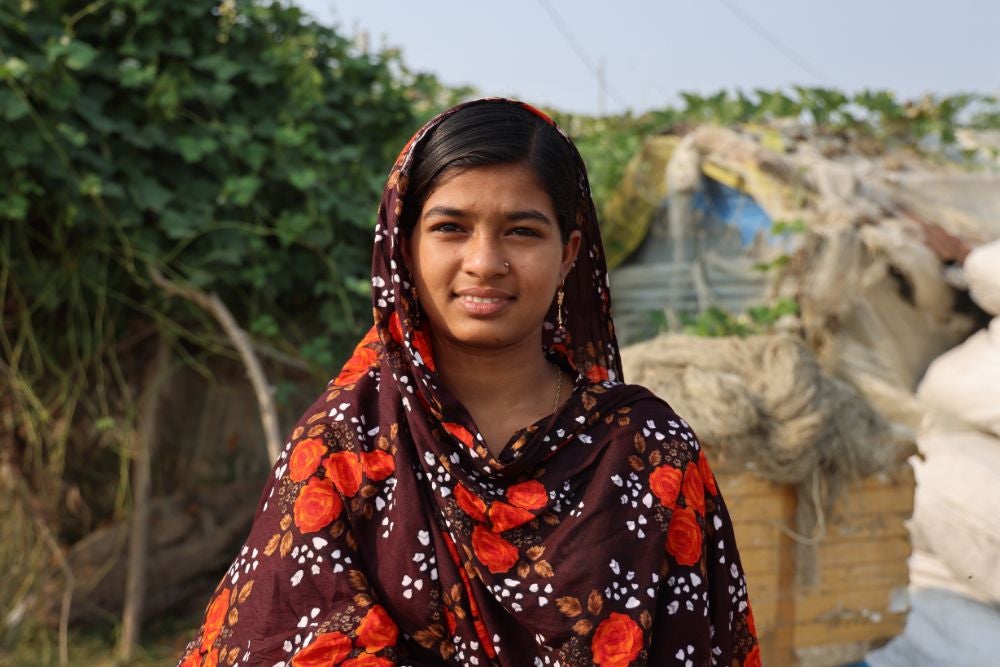
A future full of hope
Regarding her future, Tamanna said, “I want to continue my studies. I love my mom, and I want to be a good human being like her, but I don’t want to do the type of work she does. I want to be self-reliant and help my family get out of debt.”

